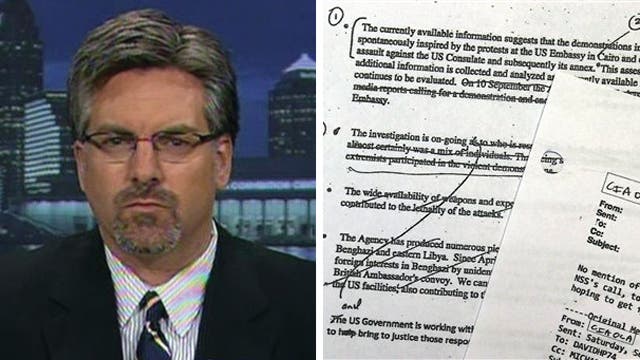Hayes: Benghazi emails contradict White House claims
Document dump by White House sparks more questions than answers in Benghazi tragedy
House Republicans continue to demand more documents out of the Obama administration on the Benghazi terror attack, praising the release of 100 pages of internal deliberations as an encouraging step but claiming the government should do more to clear up questions.
"While these hundred are good and they shed light on what happened, we have nearly 25,000 that they haven't released," Rep. Jason Chaffetz, R-Utah, told Fox News.
He noted the documents released late Wednesday -- a release long sought by Republicans -- for the most part covered two days of communications. "What about the ones before and what about all the ones after? Let's go ahead and release those as well," Chaffetz said.
The administration gave no indication that more documents would be forthcoming. White House spokesman Eric Schultz said the decision to make the records public was an "extraordinary step." He said "hopefully" Washington can now move beyond the controversy.
Democratic Sen. Bob Menendez also said on the Senate floor Thursday that the issue has been "fully vetted."
The information contained in the emails and notes released Wednesday depicted how several different agencies were deeply involved in editing and polishing the administration's internal story-line on Benghazi in the days following the attack. They showed how State Department officials in particular voiced concern that references to prior attacks and security warnings could be used to criticize the administration -- those references were later stripped.
Further, they showed how references to Al Qaeda and Islamic extremists were ultimately removed as well.
Some Republicans refrained from calling for more documents. Sen. Saxby Chambliss, R-Ga., vice chairman of the Senate intelligence committee, said in a statement he was "glad" to see the White House publish the talking points. "I have been pushing for the release of this paper trail for weeks," he said.
The office of House Speaker John Boehner called the release "long overdue," but also indicated it wanted to see more. Spokesman Brendan Buck said "there are relevant documents the administration has still refused to produce" and said they hope the "limited release of documents is a sign of more cooperation to come."
The documents were released under pressure after whistle-blowers testified on the Hill and some email excerpts leaked to the media last week.
The documents showed the White House, along with several other departments, played a role in editing the so-called "talking points," despite claims from the White House that it was barely involved. And they showed then-CIA Director David Petraeus objected to the watered-down version that would ultimately be used as the basis for U.N. Ambassador Susan Rice's flawed comments on several TV shows the Sunday after the attack.
"Frankly, I'd just as soon not use this," Petraeus told his deputy in a Sept. 15 email.
The 100-page file showed that State Department officials were even more heavily involved in editing the "talking points" than was previously known.
One email sent the Friday night after the attack from an unknown official said: "The State Department had major reservations with much or most of the document."
Individual emails leading up to that assessment show State officials repeatedly objecting to the intelligence community's early version of events.
The early versions stated that "Islamic extremists with ties to Al Qaeda" participated in the assault and discussed links to militant group Ansar al Sharia -- and referenced prior attacks against western targets in Benghazi, as well as intelligence warnings.
State Department spokeswoman Victoria Nuland complained that she had "serious concerns" about "arming members of Congress" to make assertions the administration was not making. "In same vein, why do we want Hill to be fingering Ansar al Sharia, when we aren't doing that ourselves until we have investigation results ... and the penultimate point could be abused by Members to beat the State Department for not paying attention to Agency warnings so why do we want to feed that either? Concerned ..."
She also wrote that the line saying the administration knows there were extremists among the demonstrators "will come back to us at podium," voicing concern that some would question how the administration knows that. She said she would "need answers" if that line is used.
In response to her concerns, Assistant Secretary of State David S. Adams voiced agreement. He said the line about prior incidents "will read to members like we had been repeatedly warned."
The emails show Petraeus' deputy Mike Morell involved in circulating and revising the talking points. In one email, he too noted the State Department had "deep concerns" about referencing prior "warnings."
As late as 3:04 p.m. on Friday, the points still included references to extremists tied to Al Qaeda and an "attack."
The terms "Al Qaeda" and "attack" were stripped by 4:42 p.m. Senior administration officials indicated Wednesday these terms were dropped after internal CIA deliberations.





